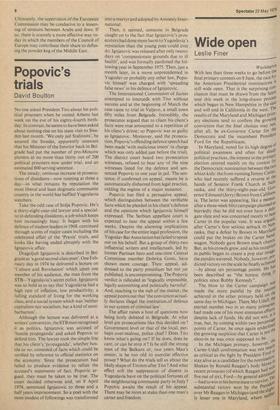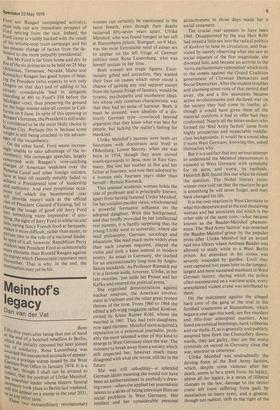Wide open
Leslie Finer Washington With less than three weeks to go before the final primary contests on 8 June, the race for the American Presidential nominations is still wide open. That is the surprising conclusion that must be drawn Trom the latest step this week in the long-drawn process which began in New Hampshire in the east and will end in California in the west. The results of the Maryland and Michigan Pri ary elections tend to confirm the growing conviction that the final choices may 1'1c:it' after all, be ex-Governor Carter for the Democrats and the incumbent President Ford for the Republicans. In Maryland, noted for its high degree of political awareness and often for shad)! political practices, the interest in the prirnal election centred mainly on the contest for the Democratic nomination between the two whizz-kids : the front-running Jimmy Carter, who had recently suffered a reverse at the hands of Senator Frank Church in Neb. raska, and the thirty-eight-year-old Gov' ernor Edmund (Jerry) Brown from California. The latter was appearing, like a mete'_„r' after a three-week blitz campaign planned hurriedly that he did not even have a dele; gate slate and was concerned merely to bel Carter in the popular vote. It was argt.leku' after Carter's first serious setback in Ne'ci raska, that a defeat by Brown in Marylatl, could put the brakes on the Carter bann* wagon. Nobody gave Brown much chancer; But, as his crowds grew, and as his recePtin in public began to create a pop star image' the pundits wavered. Nobody, however, Preci dicted victory on the scale he finally achieve,, —by about ten percentage points. He tici been described as "the hottest thing politics since Bobby Kennedy". Was The blow to the Carter campaign cs made the more painful by the succte achieved in the other primary held on tl:e same day in,Michigan. There Mo the same number two in so many primatie,„, had made one of his most strenuous effol despite lack of funds. He did not win, true, but, by coming within two percerano:d points of Carter, he once again underline,1 the growing suspicion that Carter is not tP shoo-in he was. once supposed to be. the In the Michigan primary, however Carter-Udall confrontation was not nellto as critical as the fight by President Fciru.nti. stay alive as a candidate for the nominati-ip Shaken by Ronald Reagan's body b10 recent , recent primaries (of which Reagan had '011 five out of six), Ford—by general adMiss,iche —had to win in his home state to survive:dent substantial victory won by the Pres,1,4t, over Mr Reagan in Michigan (and the slier ly lesser one in Maryland, where nelt
Ford nor Reagan campaigned actively), Must rule out any immediate prospect of Ford retiring from the race. Indeed, the Ford camp is visibly bucked with the result of his whistle-stop train campaign and his last-minute change of tactics from the defensive to the more palpably presidential.
But Mr Ford is far from home and dry. In five of the six primaries to be held on 25 May (Arkansas, Tennessee, Nevada, Idaho and .1(entnekY) Reagan has good hopes of beating the President (who expects to win only Oregon on that day) and of adding to his already considerable lead in delegates (standing at 491 to Ford's 334 before the Michigan vote), thus preparing the ground for the huge winner-take-all contest in California on 8 June. In spite of this upswing in },teagan's fortunes, the President is still widely considered to be the most likely choice in Kansas City. Perhaps this is because some Weight is still being attached to the advantages of the incumbency. On the other hand, Ford seems increasingly unable to take advantage of the ineurnbencY. His campaign speeches, largely concerned with Reagan's vote-catching Charges of American weakness over the Panama Canal and other foreign matters, have at least till recently notably failed to achieve a Presidential tone of leadership afid authority. And even propitious occasions (of which the bicentennial year vv.11! Provide many) such as the official visit of President Giscard d'Estaing, fail to Fhange the image of good old Jerry Ford to something more impressive: if any,11.1ng, the sight of Jerry Ford in white tie and `ails, eating fancy French food at banquets, lii.akes it more difficult, rather than easier, to Picture him in the role of a national leader. ,n.splte of it all, however, Republican Party r;flisdnm
sees President Ford as substantially
ore electable than Ronald Reagan against no matter which Democratic opponent next
l3ve.Mber. That is why, in the end, the 110Mination may yet be his.



































 Previous page
Previous page